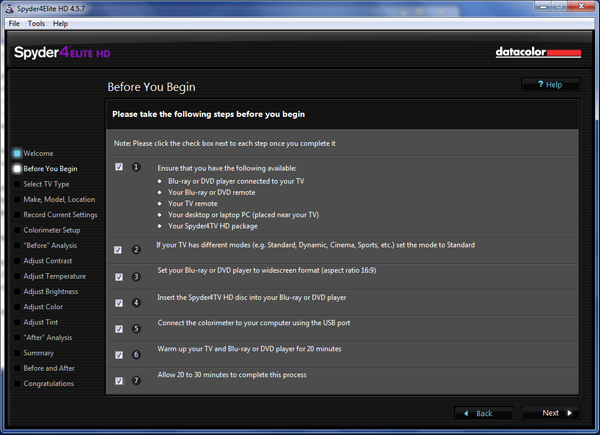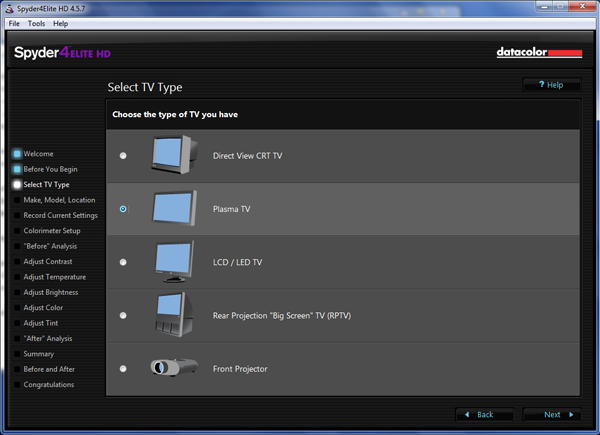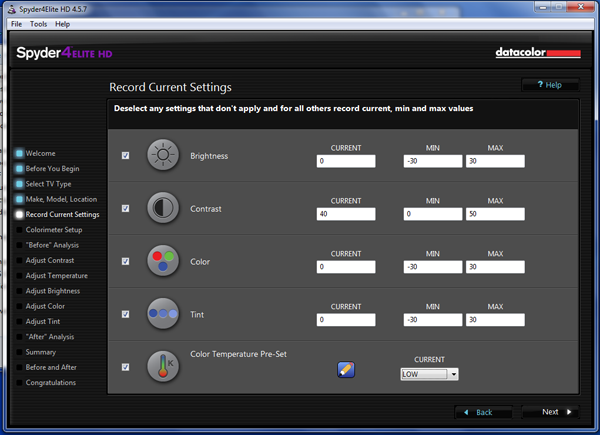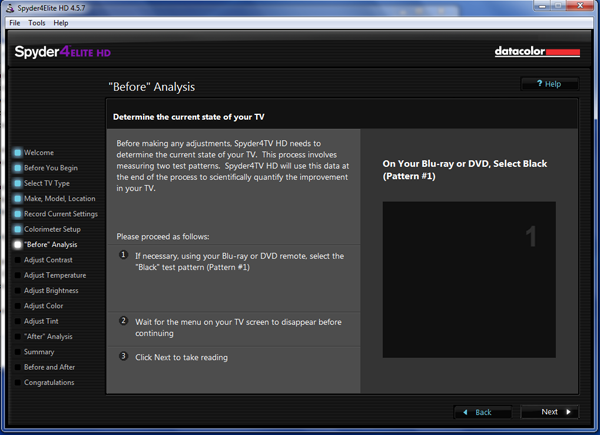How To Calibrate Your HDTV
You've already seen our instructional guides for calibrating computer monitors. In today's story, we help get you started dialing your HDTV as well. From beginner to expert, we have you covered with a handful of different approaches.
SpyderHD Walkthrough, Part 1
We recently received a press sample of Datacolor’s SpyderHD kit for evaluation, so we thought we’d include our findings and observations here. The kit comes with a Spyder4 colorimeter, mounting tools for both panels and projectors, a set of test patterns on Blu-ray and DVD (PAL and NTSC), plus color and white point samples for use by photographers. It all comes neatly packaged in a nice carrying case for $349.
By the way, if you’re only interested in calibrating a flat-panel TV, you can purchase the Spyder4TV HD for $129. It includes just the meter, software, and test pattern discs.
We’re not going to cover the entire kit today. But we will install the software on our Dell XPS laptop and run a few test calibrations on our reference Pioneer PRO-111FD plasma display.
After installing and activating the software, the wizard begins by asking you if you’re calibrating a computer monitor or HDTV. Selecting HDTV means you’re using the test patterns on the provided Blu-ray disc. At this point, your TV should be warmed up for at least 20 minutes and the pattern disc should be in your player. And just like on the previous page, choose the Movie or Cinema mode. On our Pioneer, we’re starting in the Pure mode.
First up is a simple checklist to be sure the meter is connected, the pattern disc is in the player, and so forth. You’ll have to check all the boxes before you can click Next.
Now choose your display type. It matters because the meter uses different measurement offsets for each technology. Plus, the wizard needs to branch to the proper screen that shows you how to place the meter.
Run through the full ranges of each setting then enter the correct numbers in the Current Settings screen. Later, you’ll be told exactly what settings to enter as SpyderHD takes measurements and determines the optimal values for each image adjustment.
Get Tom's Hardware's best news and in-depth reviews, straight to your inbox.
The next series of screens address each control individually. You’re told which pattern to select, what setting to choose, and when to take a measurement. Controlling the pattern disc is extremely easy. You can either make your choice from the disc’s main menu or use the chapter skip buttons on your player’s remote. SpyderHD only uses six patterns and you don’t have to engage in too much back and forth to get your results.
Current page: SpyderHD Walkthrough, Part 1
Prev Page Hands-On: Basic Calibration With Spears & Munsil HD Benchmark Next Page SpyderHD Walkthrough, Part 2
Christian Eberle is a Contributing Editor for Tom's Hardware US. He's a veteran reviewer of A/V equipment, specializing in monitors. Christian began his obsession with tech when he built his first PC in 1991, a 286 running DOS 3.0 at a blazing 12MHz. In 2006, he undertook training from the Imaging Science Foundation in video calibration and testing and thus started a passion for precise imaging that persists to this day. He is also a professional musician with a degree from the New England Conservatory as a classical bassoonist which he used to good effect as a performer with the West Point Army Band from 1987 to 2013. He enjoys watching movies and listening to high-end audio in his custom-built home theater and can be seen riding trails near his home on a race-ready ICE VTX recumbent trike. Christian enjoys the endless summer in Florida where he lives with his wife and Chihuahua and plays with orchestras around the state.
-
vmem Thanks for the detailed and great write up. it is inspiriting as alwaysReply
Though honestly, for the "average" consumer, I find it hard to justify spending $350 to calibrate a $500 or so monitor set up and maybe a $800-1200 TV. I feel this is the type of thing you have to really get into (and end up doing it for free for your friends and family) -
rdc85 Well I'm using the pic for calibrating the monitor right now :D...Reply
looks like my brightness and contrast slights off -
crisan_tiberiu the question is: why arent the producers calibrate the TVs right out of the factory? why? is it so hard to make a preset for the TVs? 99% of the TVs that come out of a factory will have the same "crappy" default settings. And sorry, i wont spend 350$ to calibrate my TV ^^ no wayReply -
shahrooz well the first time I saw a calibrate your something's screen article was a year ago. Back then I found out "one does not simply calibrate the screen of something"Reply -
The_Icon This is something I have been wanting for a long time now. Is there any good free tool to calibrate both the HDTV and my monitor? The TV is connected to my PC as well.Reply -
vmem Reply14324342 said:the question is: why arent the producers calibrate the TVs right out of the factory? why? is it so hard to make a preset for the TVs? 99% of the TVs that come out of a factory will have the same "crappy" default settings. And sorry, i wont spend 350$ to calibrate my TV ^^ no way
They do calibrate the TVs (any manufacturer worth their salt anyway). the problem is two fold: first all TVs / monitors are relatively low margin because the market is highly competitive. unless you're paying a premium for "professional" monitors such as the Dell ultrasharp series, most panels will be calibrated the 'easy' way to some factory pre-set that is considered "good enough".
the second thing is that everyone's lighting conditions are different. maybe your room is brighter than mine and you like having the traditional type of bulbs that have a yellow / orange hue and I use white light bulbs. these things have a huge impact on how your TV looks, so at the end of the day the consumer will always need to do some calibration if you want perfect color reproduction.



